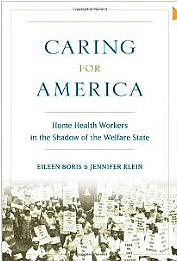‘Caring for America’—Feminist scholar describes underappreciated caregivers
April 21st, 2013 Posted in Arts and LifeLOGAN—Feminist scholar Eileen Boris of the University of California, Santa Barbara, came to Utah State University this week to introduce faculty and students to her current research. In a state that is far from the forefront of the organizing efforts of workers’ rights, Boris spent the afternoon discussing the collaborative efforts of low-wage care workers outside the borders of Utah.
 “Our study focuses on personal attendants, in-home support workers, homemaker-housekeepers and home health aides,” Boris said, referring to her book with Jennifer Klein, Caring for America: Home Health Workers in the Shadow of the Welfare State. “The premise of our book is that the labors of care, reproductive labors as they’re called, are work. That cooking, cleaning and caring is work.”
“Our study focuses on personal attendants, in-home support workers, homemaker-housekeepers and home health aides,” Boris said, referring to her book with Jennifer Klein, Caring for America: Home Health Workers in the Shadow of the Welfare State. “The premise of our book is that the labors of care, reproductive labors as they’re called, are work. That cooking, cleaning and caring is work.”
Addressing an intimate audience of only 11, Boris attempted to abolish a commonly accepted misperception: “Whether paid or not paid,” she explained, “it is work.”
USU sociology Professor Christy Glass this is one of Boris’s most important messages. “When we as Americans depend on workers to clean our homes, to bath our sick and to provide home care for our elderly, we must recognize the work they do as work,” Glass said. “Unfortunately, despite how important this work is to supporting the quality of our daily lives, the workers who provide this care are marginalized, often invisible, and receive poverty wages.”
Boris is Hull Professor and chair of the department of feminist studies at UC-Santa Barbara. Her presentation focused on the predominately female home-care labor force in the United States, and what America now identifies as caregiving with emphasis on giving.
As a historical norm, “women give care,” she explained, and “men make money.” As a consequence of this ideology, the work that was once the responsibility of the housewife now meets the qualifications and demands of a full-fledged career. But because of the preconceived notion that caring and nurturing are easy and intuitive, caregivers are commonly underpaid. Even men within this industry receive lower wages than those in comparable industries, a process known as feminization.
“The labor is devalued,” Boris said. “ We look at care as love rather than work.
 Glass agreed. “This is a skilled professional work—in the service of care—and should be recognized and rewarded as such,” she said, explaining that the presence or absence of “love” has nothing to do with how these employees conduct themselves professionally. “We do not, for instance, require our doctors to love us. What we desire from doctors is outstanding medical care, and we pay dearly for [it].”
Glass agreed. “This is a skilled professional work—in the service of care—and should be recognized and rewarded as such,” she said, explaining that the presence or absence of “love” has nothing to do with how these employees conduct themselves professionally. “We do not, for instance, require our doctors to love us. What we desire from doctors is outstanding medical care, and we pay dearly for [it].”
During the Q&A following Boris’s lecture, and compared one audience member compared caregiving to the sex trade. She suggested that if these workers are expected to accept low amounts of compensation for byproducts of their innate gender characteristics, then they have no option but to prostitute their services. This is something that Boris said has been considered before.
We “justify [the low wages] in terms of the paramount needs of the recipients,” she said, explaining that there are different emotions and perspectives tied to the providers and the receivers of care.
“We don’t really know how the story ends,” she said. “We’re still waiting for Obama . . . waiting for a final rule.”
TP
Tags: Christy Glass, Eileen Boris, health care

Sorry, comments for this entry are closed at this time.